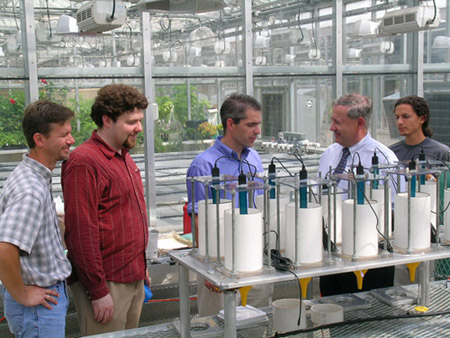You are here
Our Research and Development Teams
We are a transdisciplinary team from leading research and land-grant Universities around the United States.

The University of Maryland, the University of Maryland Center for Environmental Science, Carnegie Mellon University Robotics Institute, Colorado State University, Cornell University and the University of Georgia have teamed to up to approach this research from a number of different angles.
Our major objective is to test the application of sensor networks in intensive plant production environments. Our commercial partner in this research effort is Decagon Devices, Inc., based in Pullman, WA.
The Carnegie Mellon Robotics Institute, Decagon Devices and Antir Software are leading our hardware and software development, focused on developing the next generation of wireless sensor nodes and a sophisticated software interface for highly intensive horticultural production and environmental monitoring systems.
The University of Maryland, Cornell University and the University of Georgia are examining micro-scale issues, researching sensing and variability issues (both plant and soil/substrates) in the root zone, using real-time information. We are working across production environments -- from field soil systems, to container-production nursery and greenhouse systems.
Colorado State University is working at the macro-scale level, using sensor data from both the aerial and root environments to predict real-time water use for large-scale (> 100 acre) operations.
The University of Maryland and the University of Maryland-Center for Environmental Studies are jointly examining the social and economic dimensions of this project, and will quantify both the private (on-farm) and public (environmental) benefits of this research.
Perhaps most importantly, the data we are gathering is from sensor networks in our Industry Partners' commercial nurseries and greenhouses, in addition to our own research networks. It is this industry network information that is extending our knowledge and experience into situations that are impossible to simulate in a pure research environment.
